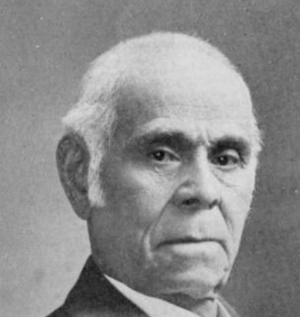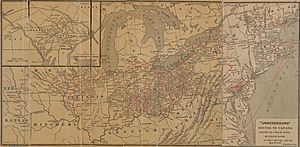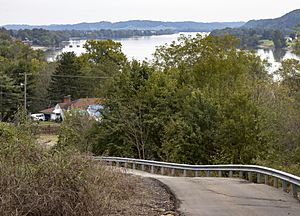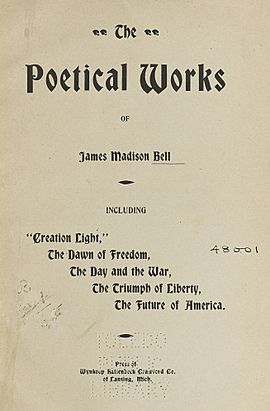James Madison Bell facts for kids
Quick facts for kids
James Madison Bell
|
|
|---|---|
 |
|
| Born | April 3, 1826 Gallipolis, Ohio |
| Died | March 4, 1902 (aged 75) Chicago, Illinois |
| Occupation | Plasterer and poet-lecturer |
| Nationality | American |
| Education | Cincinnati High School for Colored People |
| Spouse | Louisiana Sanderlin |
James Madison Bell (born April 3, 1826 – died March 4, 1902) was an amazing African-American poet, speaker, and activist. He worked hard to end slavery, a movement called abolitionism. He was the first African-American poet born in Ohio. People even called him the "Bard of the Maumee," after the Maumee River. He used his poems and speeches to fight for freedom and equal rights for African Americans.
Contents
Early Life in Ohio
James Madison Bell was born free in Gallipolis, Ohio, on April 3, 1826. He went to a school for Black children. This school was run by Elisha Barnes at the Bethel Church. He lived with his parents until he was 16 years old.
Even though Ohio was a free state (meaning slavery was not allowed), there were still "Black laws." These laws made it hard for African Americans to live freely. For example, they had to prove they were free. They also had to pay a $500 bond to show they could support themselves.
Life in Cincinnati
In 1842, James moved to Cincinnati. He lived with his brother-in-law and worked as a plasterer. This was hard work, often 12 to 14 hours a day. In the evenings, he went to the Cincinnati High School for Colored People.
This school was started in 1844 by Reverend Hiram S. Gilmore. It had great teachers who taught many subjects like English, Greek, Latin, music, and drawing. The school helped Bell learn about the strong anti-slavery movement.

Cincinnati was an important city on the Underground Railroad. This was a secret network that helped enslaved people escape to freedom in the North. Bell helped many runaway slaves travel through the city. He wrote poems about making life better for African Americans, especially those who were enslaved. His anti-slavery poems and speeches became very popular. He also wrote about the need for education and civil rights. He gave many lectures, but he still earned most of his money from plastering.
Bell married Louisiana Sanderlin on November 9, 1847. They had seven children together. Because he was worried about his family's safety, Bell moved them to Chatham, Canada, in 1854. Chatham was one of the last stops on the Underground Railroad.
Moving to Canada
Bell believed he and his family would have better chances in Canada. At this time, a Supreme Court case called Dred Scott v. Sandford (1854) ruled that free Black people were not guaranteed American citizenship. This made many African Americans feel unsafe in the United States.
Bell and his family were among about 30,000 people who escaped to Canada by the 1850s. Many settled in places like Chatham, North Buxton, and Dresden. These towns became thriving communities with many businesses and trades. There were brickyards, mills, and factories. By 1850, one-third of Chatham's population was African American. Bell continued to work as a plasterer. He also developed his strong beliefs about ending slavery and fighting for civil rights.
He became good friends with John Brown, a famous abolitionist. Bell supported Brown's plan to raid Harpers Ferry in 1859. He helped find people to assist Brown and raised money for the raid. Bell was also the secretary of the Chatham Vigilance Committee. This group helped rescue Sylvanus Demerest, who had been kidnapped to be sold into slavery. Bell stayed in Canada until 1860. His family remained in Ontario until the end of the American Civil War. After the war, Bell brought them to Toledo, Ohio.
Fighting for Freedom Across America
In 1860, Bell moved to San Francisco, California. There, he kept working as an activist and writing anti-slavery poems. He met many leaders who wanted to help African Americans succeed. These leaders included Mary Ellen Pleasant and Philip Alexander Bell, who edited a newspaper called Pacific Appeal.
Bell was involved in African Methodist Episcopal Church meetings. He fought against state laws that were unfair to African Americans. He also pushed for better education for Black children. While in California, he wrote important poems like "Emancipation," "The Dawn of Freedom," and "Lincoln." After five years, he left San Francisco and traveled to many other states. He continued to work as a plasterer and give lectures.
In January 1864, he went to a celebration in Cincinnati. It was for the first anniversary of the Emancipation Proclamation. This was the order that declared many enslaved people free. Bell read his poem "The Day and the War." He dedicated it to John Brown, calling him "The Hero, Saint and Martyr of Harpers Ferry."
His most famous poem describes the Battle of Milliken's Bend. This was the first battle where African-American soldiers fought bravely in the Civil War. Their courage changed how many people in the military and the North saw Black soldiers. It encouraged over 150,000 Black men to join the Union Army.
Bell moved to Toledo, Ohio in 1865. He kept traveling, plastering, and giving lectures. His long poems, often 750 to 950 lines, talked about slavery, the Civil War, freedom, and the Reconstruction era. He also wrote shorter poems, like a funny one about President Andrew Johnson. Some of his most loved poems were "Lincoln," "Emancipation," and "The Dawn of Freedom." Through his poems, he taught newly freed people about their rights and duties as citizens.
William Wells Brown said Bell's speeches were "soul-stirring." His friend, Reverend Benjamin W. Arnett, often traveled with him. Arnett said that Bell's talks inspired many young men to achieve greatness.
Bell was an active member of the African Methodist Episcopal Church (AME). He was also a Sunday School superintendent from 1870 to 1873. In 1884, President Chester A. Arthur even met with Bell and other AME Church leaders at the White House.
In 1868 and 1872, Bell was chosen as a delegate for the Republican conventions. He strongly supported Ulysses S. Grant for president in both elections. In 1901, he published a book of his poems called Poetical Works.
Later Years
James Madison Bell died in Chicago on March 4, 1902. He passed away at the home of his son, Andrew Bell. By this time, his wife and four of their children had also passed away.
His Works
Poems
- A Poem (1862)
- The Day and the War (1864)
- Poem (about the assassination of Lincoln, 1865)
- Valedictory on Leaving San Francisco (1866)
- The Progress of Liberty (1866)
- The Triumph of Liberty (1870)
 | Shirley Ann Jackson |
 | Garett Morgan |
 | J. Ernest Wilkins Jr. |
 | Elijah McCoy |



